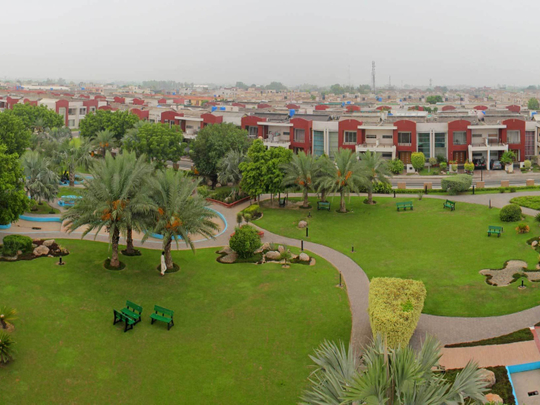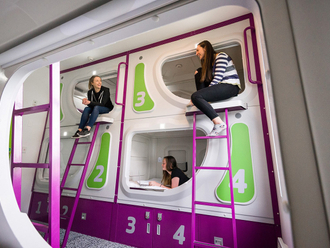
Although real estate has always been a major income generator in Pakistan, the country’s precarious security situation has weakened investor confidence and disrupted business activities over the past few years. The sector is now hoping that Prime Minister Nawaz Sharif’s government, which came to power last year after a landslide victory, will provide some kind of tangible support to drive it.
Mohsin Sheikhani, Chairman of the Karachi-based Association of Builders and Developers (ABAD), predicts a more bullish year for the real estate sector based on the new government’s vision and promises for policy changes. “We have a positive outlook for the real estate sector in 2014. The prime minister’s Vision 2025 aims at providing 500,000 low-cost houses to the lower segment of the society,” Sheikhani says.
ABAD was formed in 1972 with the objective of unifying and streamlining the construction activities of the private sector.
The new government has announced special privileges and incentives for a number of industries and construction is one of them. “These industries have been named
greenfield projects. Investment in green field industrial projects will be immune from any probe or scrutiny of the source of investment,” Sheikhani explains.
Mohammed Yasir Qidwai, Associate Director, Corporate Solutions and Research, Colliers International Pakistan, offers insight into the direction the market is set to take. “Now, it all depends on how the new government manages to implement its policies. However, we think [a] few sectors such as residential real estate and retail will outperform others,” he says.
“In 2013, [the] real estate sector fared well as people were expecting a change in the government. Because of this, housing prices grew by 15 to 25 per cent. The biggest challenge for the sector is that it is still not regularised and structured. It still depends heavily on the informal side of the economy. Furthermore, lack of transparency, limited mortgage and house financing options also concern the industry,” says Qidwai.
In spite of the challenges, there are many opportunities in the industry that are yet to be exploited fully. Property developers are upbeat about the long-term prospects for the segment. It is anticipated that the market will see improved confidence levels and increased transactions due to an expected improvement in the economic scenario this year. Internal migration of people from villages to cities will also contribute to the demand for new homes, says a spokesperson for Emaar Pakistan, a subsidiary of Dubai-based Emaar Properties.
All investors can typically look at between 25 and 100 per cent returns within just a few years. The higher return on investment will encourage real estate buyers.
“Real estate investment is seen by local investors as a hedge against inflation and currency depreciation, and the key localities in Pakistan have seen a consistent increase in demand, which has driven prices further,” says Aqib Elahi Mehboob, COO, AKD Group.
Investment destinations
While Lahore and Islamabad are the top choices for big-ticket residential property investments, the demand for land and apartments in Karachi is also likely to pick up if the law and order in the city improves, experts say.
“There is a huge potential of investments in both posh and low-income areas. According to latest statistics, there is a dearth of over ten million houses,” says Sheikhani. “In suburbs, large tracts of land are available along the national highways and the super highway, which can be considered for investments.”
In residential properties, the Defence Housing Authority and Bahria Town projects, the Gulberg area in Lahore and Clifton in Karachi are the top destinations for investment, according to insiders. Commercial properties in Karachi, Lahore, Islamabad, Faisalabad and Hyderabad are also gaining appeal among investors. Though land in new residential community developments is the most sought-after by non-resident Pakistani (NRP) buyers, the demand for villas and apartments is also rising.
“The country’s tradition of joint family systems encourages buyers to invest in villas. High-net-worth individuals are now willing to pay a premium for ultra-luxury residences,” says the spokesperson for Emaar Pakistan.
NRPs typically favour properties that are well-maintained, involve secure transaction processes and offer an assurance of safety for ownership of property. “Customers are now more demanding, as many of them have travelled abroad, and they look for the same quality back home,” says a representative from the chief executive’s office at
Bahria Town.
Tips for buying
However, the question remains if now is a good time to invest in the country’s property market. Buyers with a short-term goal can make a decent income in Pakistan with a quick purchase-and-sell cycle of mainly off-plan properties or land in the main cities, says Zeerak Petafi, Senior Consultant, IP Global Limited, an international property investment company.
“Investors need to be fully involved in the real estate market and have very active
participation to make the right choices at the right time,” says Petafi. “[The] Majority of purchases in Pakistan turn out to be good, in terms of capital appreciation, because prices in the metropolitan cities and even the less central cities have been increasing over a period of time. Investors, however, need to keep in mind that the rental returns are not that attractive and a lot of investors face issues with sit-in tenants.”
The rate of return is good for high-profile commercial land in the top cities, if buyers can build a combination of commercial and residential units. “Usually, large companies and brands rent out such commercial spaces on a long-term contract to provide steady income along with ongoing capital appreciation,” Petafi points out.
When it comes to investments in residential properties, NRP buyers have now started to show greater preference for gated communities over small developments in city centres, as security is still a key concern in the country. The trend for community living has also picked up in a big way.
The AKD Group is building The Arkadians, a high-end, mixed-use project in Karachi. The project comprises 13 residential towers, six office towers and a mall, spread over 43 acres.
“The residential phase of the development is under way, aiming to cater to a significant pent-up demand for gated communities. Though we haven’t yet formally launched the project, we have noted a strong interest for it. The high-income customer segment, which previously preferred to reside in owner-built bungalows, has now started to opt for apartment living in gated communities,” says Mehboob.
Emaar Pakistan is currently developing two integrated lifestyle developments. In Karachi, it is developing Crescent Bay, a waterfront community of high-rise towers set along three crescent-shaped bays. In Islamabad, there is Canyon Views, an expansive gated community comprising villas and town homes.
Bahria Town has also developed Bahria Golf City Islamabad, Pakistan’s first branded golf resort with a Sheraton Hotel and Sheraton Golf & Country Club.
“If you are planning to settle back in Pakistan, you can give preference to residential properties. Otherwise you can also consider investing in more mature global markets such as London and Malaysia for medium-to long-term gains,” says Petafi.





